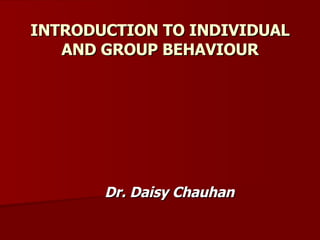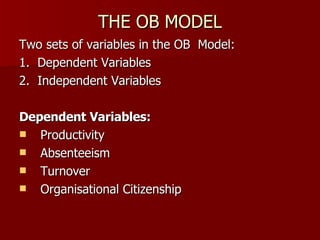Basic Concepts of Organisational Behaviour
- 1. INTRODUCTION TO INDIVIDUAL AND GROUP BEHAVIOUR Dr. Daisy Chauhan
- 2. Basic Concepts of OB Why study OB? In organisations we need to understand, predict and influence the behaviour of others. To apply all concepts related to other functional areas like Marketing, Finance etc. on people. Question some of our assumptions about human behaviour To have a better understanding of self and self in relation to others To understand group dynamics To enhance leadership and decision-making skills
- 3. Basic Concepts of OB Why study OB? Replace Intuition with Systematic Study by which you can improve your predictive ability about human behaviour. Improve our understanding of expectations of others from us. Understanding of human behaviour will improve your interpersonal skills and thereby help you better deal with people and to that extent influence them.
- 4. Basic Concepts of OB Can we predict behavior? If we know how the person perceived the situation and what is important to him or her. Why is some behaviour seen as non-rational by an observer? He does not have access to the same information or does not perceive the environment in the same way. Intentions are not seen, only behaviour is seen.
- 5. Questioning our Assumptions Age is a barrier to learning. Happy workers are Productive Workers or happiness leads to productivity. Working collectively is better than working individually. Experience makes a man perfect. Men make better leaders than women. Past success is a guarantee for future success. Work pressure causes stress.
- 6. Management Functions Planning: Defining organisaitonal goals, establishing overall strategy, Developing comprehensive set of plans Organising : Designing structure, deciding on who does what, how, whom to report etc. Leading: Motivating people, directing, coordinating, resolving conflicts Controlling: Monitoring, comparing with goals, correcting
- 7. Management Roles Interpersonal Roles: 1. Figurehead 2. Leader 3. Liaison Informational Roles: 4. Monitor 5. Disseminator 6. Spokesperson Decisional Roles: 7. Entrepreneur 8. Disturbance Handler 9. Resource Allocator 10. Negotiator
- 8. Management Skills Tech.Skills Technical skills Technical Skills Top Mgt. Middle Mgt. Lower Mgt. Human Skills Human Skills Human Skills Conceptual Skills Conceptual Skills Conceptual Skills
- 9. Management Skills Motivating Communicating Creating Visioning Mentoring Teambuilding Listening Trust Building Committing Collaborating
- 10. Management Skills Individual components: Upto 10 - Low 11-15 - Average 16-20 - High Overall Score: Upto 100 - Low 101-150 - Average Above 151 - High
- 11. Competencies at different levels KNOW WHAT KNOW HOW KNOW WHY Lower Level Middle Level Top Level - Knowledge - Skill - Process - Innovation - Conceptual & - Contextual understanding
- 12. Levels of Analysis in OB INDIVIDUAL LEVEL GROUP LEVEL ORGANISATION SYSTEMS LEVEL
- 13. THE OB MODEL Two sets of variables in the OB Model: 1. Dependent Variables 2. Independent Variables Dependent Variables: Productivity Absenteeism Turnover Organisational Citizenship
- 14. THE OB MODEL (Contd.) INDEPENDENT VARIABLES: Individual Level Variables Biographical characteristics (age, gender) Personality characteristics (extroversion, conscientiousness) Emotional Framework Values & Attitudes Basic Ability levels Group Level Variables: Interpersonal relationships & interpersonal conflicts Group cohesiveness Trust and Openness Commitment Leadership Power & Politics Organisation Systems Level Variables: Organisational Culture Organisational Structure HR Policies & Practices
- 15. OB DISCIPLINE Conflict, Intra-organisational Politics, Power Political Science Org. System Organisational culture and Env. Comparative Values & Attitudes, Cross-cultural Analysis Anthro pology Behavioural Change, Attitudinal Change, Communication, Group Processes, Group DM Social Psy. Group Formal Orgn. Theory, Technology, Change, Culture Group Dynamics, Work Teams, Communication, Power, Conflict, Inter-group Behaviour Sociology S T U D Y O F O B Individual Learning, Motivation, Personality, Emotions, Perception, Training, Leadership Effectiveness, JS, Individual DM, PAS, Attitude Measurement, Employee Selection, Work Stress Psychology Output Unit of Analysis Contribution Behavioral Science
- 16. CHALLENGES & OPP0RTUNITIES FOR OB Responding to Globalisation Managing Workforce Diversity Improving Quality and Productivity Attracting and Retaining Talent Improving Customer Service Improving People Skills – Empowering People Coping with Uncertainty and Ambiguity Managing Change Helping Employees balance Work/Life Conflicts Improving Ethical Behaviour















